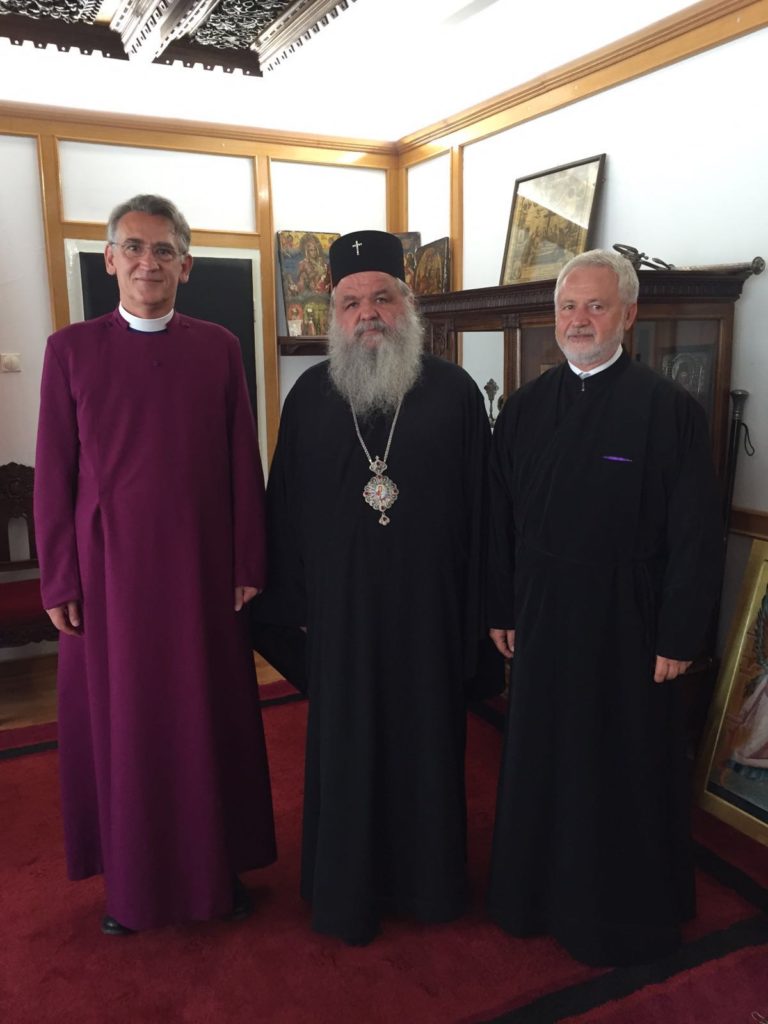Bishop Dr. Harald Rein, Old Catholic bishop in Switzerland, and the Revd Ioan L. Jebelean, Ecumenical Officer of the International Bishops’ Conference, visited Macedonia from 11 to 16 August 2016. They had been invited by Archbishop Stephen of Ohrid, the Metropolitan of the Macedonian Orthodox Church. Their visit was an occasion to discover points of contact between Switzerland and the distant country of Macedonia.
As a result of migration, there are currently three Macedonian Orthodox congregations in Switzerland. The congregation in Triengen recently became the first to open its own place of worship. The integration of Orthodox Christians is an important matter for the Old Catholic Church of Switzerland and the Swiss National Ecumenical Council. As Macedonia has a large Muslim minority (around 20 per cent of the population), the country’s government and the Macedonian Orthodox Church are very interested in how the cooperation between the various denominations and religions works in Switzerland. In the years following Macedonia’s independence from Yugoslavia, inter-ethnic and inter-religious violence was rife, and NATO had to dispatch peacekeeping forces.
Two years ago, the Revd Dimitriev Stoil became the first Erasmus scholarship holder from Macedonia to study at the Department of Old Catholic Theology at the University of Bern. The Macedonian Orthodox Church runs its own theological college in Skopje and a Faculty of Theology at the Saints Cyril and Methodius University of Skopje. As the faculty currently offers only Bachelor’s and Master’s degrees, most post-graduate students go to Bulgaria or Italy to continue their studies. Closer cooperation with the Department of Old Catholic Theology at the University of Bern is now being considered. This could also contribute to strengthening inner-Orthodox relations at the academic level. The Balkan Orthodox Churches face some considerable problems whose roots go back to the break-up of Yugoslavia. When Macedonia declared independence in 1991, the Macedonian Orthodox Church declared itself autocephalous. The Greek Orthodox Church, however, is not prepared to acknowledge this autonomy unless the Macedonian Orthodox Church becomes an Orthodox Archbishopric of Ohrid and removes “Macedonian” from its name. This stems from the long-standing dispute between Greece and Macedonia regarding the use of the name Macedonia and the appropriating of figures such as Alexander the Great that are historically considered part of Greek culture. Another dispute has arisen with the Serbian Orthodox Patriarchate in Belgrade, which does not want to grant the Macedonian Orthodox Church autonomy unless under its authority. Relations with the other Orthodox Churches are normal, especially with the Churches of Bulgaria, Rumania and Russia.
The visit programme began in Skopje, where the Revd Dimitriev Stoil was on hand as an interpreter and driver. Bishop Harald and the Revd Ioan first visited the Muslim Old Town and the Christian city centre with its churches. On the second day, Metropolitan Stephen received Bishop Harald at his residence. The next visit was to Bishop Kiro Stojanov, who is both the Roman Catholic Bishop of Skopje and the Apostolic Administrator and Exarch of the Macedonian Greek Catholic Church. He speaks fluent German and regularly comes to Switzerland to confirm Macedonian Catholics. Roman Catholics account for only two per cent of the Christian population in Macedonia. In the Eastern Catholic Churches that are in full union with the Roman Catholic Church, the Pope is recognised as the head of the Church, but priests are allowed to marry and bishops are elected. The programme continued with visits to various Protestant churches (whose congregations make up only a very small minority of Christians in Macedonia), the Macedonian Orthodox Faculty of Theology, and the theological college.
The following day, Bishop Harald and the Revd Ioan went to Tetovo to meet Bishop Josif of Tetovo and Gostivar, the only diocese of the Macedonian Orthodox Church with a Muslim majority of 80 per cent. He is responsible for 60,000 Christians in 15 congregations and for two monasteries. The conversation with him focused on interreligious dialogue.
The destination for the next two days, with stops at several monasteries on the way, was Ohrid, a city often referred to as the “Jerusalem of the Balkans”. Situated at Lake Ohrid, the city has 364 churches and is popular with tourists. Cars with Swiss number plates are everywhere. The tour then continued to Strumica, close to the borders with Bulgaria and Greece. The Revd Dimitriev Stoil is in charge of a congregation there; it is also the region with the most monastic communities – both monks and nuns – of the Macedonian Orthodox Church.
The evening meal on the final day was with Metropolitan Stephen, Prof. Gjoko Gjorgjievski and other professors from the Faculty of Theology. Metropolitan Stephen emphasised the importance of his Church’s contact with the Old Catholic Church of Switzerland, a builder of bridges in many respects.
mw

